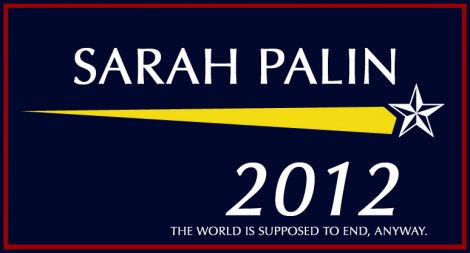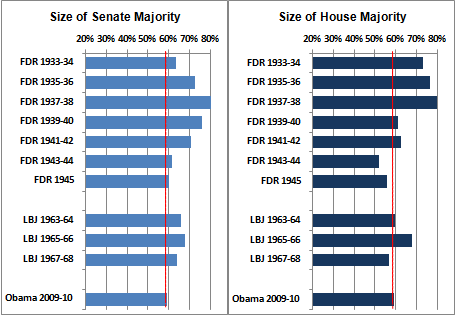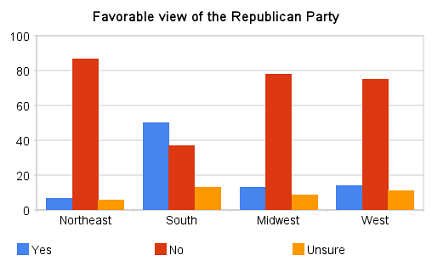The Senate of the United States shall be composed of two Senators from each State, elected by the people thereof, for six years…
There’s a push from right-wingers to repeal the 17th, along with some other amendments as well, not to mention some new amendments they want added. Curious, as the right wing has also been busy of late bashing Obama, Kagan, and Thurgood Marshall for saying that the Constitution, when written, was an “imperfect document.” Strange that they wish to tinker so with perfection.
In any case, I was curious as to why they 17th was a sore point with them. What’s wrong with the people electing senators directly? Well, according to the groups who want this, if the people elect senators directly, that means that the individual has less power. The only way to empower the individual is to take away their right to vote for a senator and put it into the hands of the state legislature. That makes sens–wait, huh? What?
Well, they do seem to have a point: they say that since public elections are driven by money, that means that senators don’t really listen to individuals from their state, and instead give their full time and attention to corporations who fund their elections. OK, fair enough, as far as it goes–but I don’t really see it as being that big a difference.
First, you have the illusion of a state legislator or a congressman paying more attention to you simply because they have smaller constituencies and they must be elected more often. But do they really pay any more attention to you than they do their financial backers, or does it just seem that way?
Second, the link between you and your senator through your legislator would still be removed. Your local legislators would have their own agendas, no doubt, and if they truly controlled the senators, they would be just as wont to abuse the power as anyone else. Not to mention that there would still be plenty of chances for others to get in the way. And that leads to the third objection to the change: money follows power. Instead of dealing out the money men, the money men would simply move to sway state legislators instead of senators directly, and you’d be back at square one.
No, there’s only one way to attack corruption of this kind, and that’s to directly address the issue of money and elections. Two things need to be changed–more descriptively, two obscenities must be erased from the law books. First, the concept that a corporation is an individual and has the same rights as one. The individual rights of a corporation rest in the rights of the people who make it up; the corporation itself is a legal fiction to serve an economic purpose. Giving corporations personhood creates super-powerful “individuals” whose psychological makeup is, by nature, that of a sociopath. The fact that they control large amounts of money and thus power in our government is at the heart of what is what is most wrong with us today.
The second obscenity is the concept that money equals free speech. No it doesn’t. If money equals free speech, then we live in a plutocracy. And that’s the current legal status. If money is free speech, then anyone who makes more money instantly has more power, which goes against the very idea of a republic which practices the principles of democracy:
Republic: a state in which supreme power is held by the people and their elected representatives, and which has an elected or nominated president rather than a monarch.
In theory, a republic could be consistent with a plutocracy, but that’s not what we were brought up to believe. Maybe democracy has always been a fiction to placate us, but if we’re even going to pretend, then we must hold that the idea of money being equal to speech is poison to what we believe in.
What we need to do is to change politics in two ways, and they have to be doozies. The first is to limit the way elections are funded. The only money that should be allowed in an election must come from individual citizens and nowhere else. And each citizen may contribute no more than $20 to any one election (including their own–no personal fortunes) or specific issue. Why $20? Because more than that and the money of one individual starts to outweigh the money of others who cannot afford it. Either that, or do away with contributions altogether and make elections funded completely by the federal government. Whichever the case, the idea is to prevent large donations from making their way to politicians and thus corrupting the system.
The second way is the real game changer: political advertisements. This is where “speech” really comes into it. And this may require an amendment to that holiest of amendments, the First Amendment itself. Like it or not, political advertising sways elections, and those advertisements are bought with money. It must be made so that public advertisements which impact elections, either on issues or candidates, must be regulated. Not forbidden, but limited to those funded by the people directly. Each advertisement can only be funded by individuals giving no more than $20 each. Remember above, I mentioned the $20 limit applying not just to candidates but to issues as well; this is what I was talking about.
What’s more, the ads can only be paid for by groups that specifically assemble for the purpose of representing such issues or candidates; you can’t have unions or organizations assembled for any other purpose doing it, else you have people who gave money for something else suddenly finding their money spent on something they disagree with.
Again, either this, or nothing–no ads at all, and we assert the right to use the public airwaves, allowing politicians to make speeches, give presentations, and have debates for specified blocks of time. This does not obliterate free speech–in fact, many countries do it. In Japan, where I live, that’s how it’s done–no campaign commercials. Other countries limit advertising as well. It may go against the grain of free and unfettered speech, but it is the only way to remove the worst of poisons from the system.
Is this a curtailing of free speech? In a way, yes–but in a very fundamental way, no. Because free speech is not supposed to be about rich people having more say or a louder say than anyone else–it is supposed to be about all people having the right to say whatever they want, whenever or wherever they want. But the central principle of that is that everyone is equal, and money playing a part destroys that essential equality. The system I describe above would not prevent anyone from speaking freely–it would only prevent a few from drowning out the rest simply because they have more money than others.
We’ll never get around money buying power. Rich people will still own and control newspapers and media networks, and there are other ways to use money to influence the people as well. But just because money will always have a say doesn’t mean that we shouldn’t do our damnedest to limit what influence it does have.





